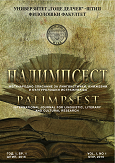APPROCHE INTERCULTURELLE OU CO-CULTURELLE DE L’ALTÉRITE DANS LE CADRE EUROPEEN COMMUN DE RÉFÉRENCE POUR LES LANGUES ET SES OUVRAGES COMPLÉMENTAIRES ?
INTERCULTURAL OR CO-CULTURAL APPROACH TO OTHERNESS IN THE COMMON EUROPEAN FRAMEWORK OF REFERENCE FOR LANGUAGES AND ITS COMPLEMENTARY WORKS?
Author(s): François S. SchmittSubject(s): Language studies, Pragmatics, Pedagogy
Published by: Универзитет »Гоце Делчев« - Штип
Keywords: action-oriented approach; co-cultural; Common European Framework of Reference for Languages; intercultural; otherness; Puren.
Summary/Abstract: Language didactics conceives the relationship to otherness according to two approaches. The first one, the intercultural approach, inherited from the communicative approach, tackles otherness through intercultural encounter. The second one, the co-cultural approach theorized by Christian Puren, corresponds to the didactic conceptions of the action-oriented approach of the foreign languages teaching based on acting with others. Through their conceptions of language-cultures and languages teaching/learning, the Common European Framework of Reference for Languages (2001) and the later complementary works appear as promoters of the action-oriented approach of foreign languages didactics. However, an analysis of their conceptions of relationships to otherness shows that these works mainly stick to an intercultural approach to otherness. Only the Companion Volume (2018) of the Common European Framework of Reference for Languages marginally opens to a co-cultural approach to the relationship to otherness. The intercultural conception of the Council of Europe's language policy disseminated in its main texts therefore seems out of step with Christian Puren's model, which bases the action-oriented approach of language teaching on a co-cultural conception of the relationship to otherness based on the principle of negotiated culture by the interactants.
Journal: Палимпсест, Меѓународно списание за лингвистички, книжевни и културолошки истражувања
- Issue Year: 8/2023
- Issue No: 16
- Page Range: 167-177
- Page Count: 11
- Language: French

